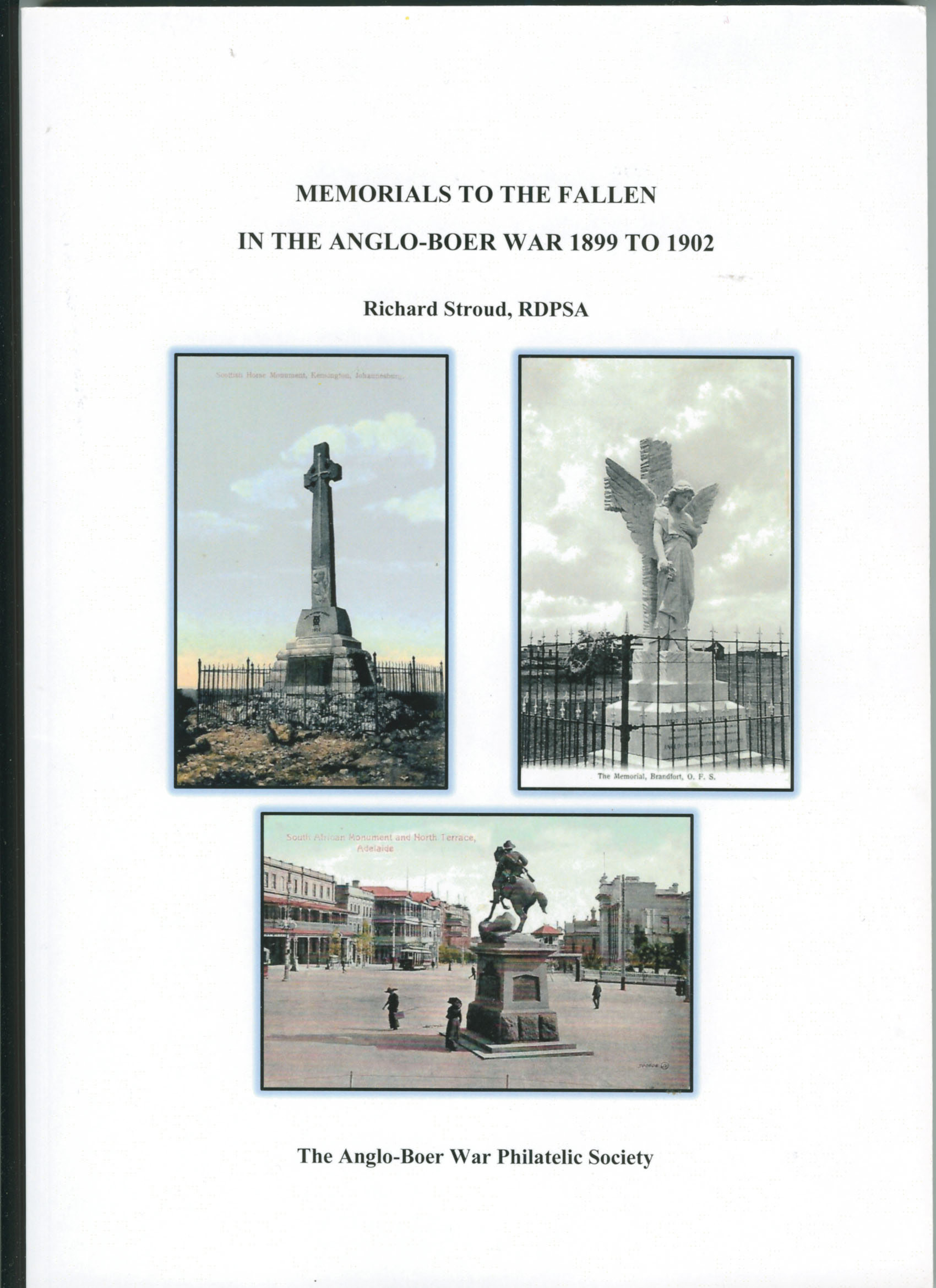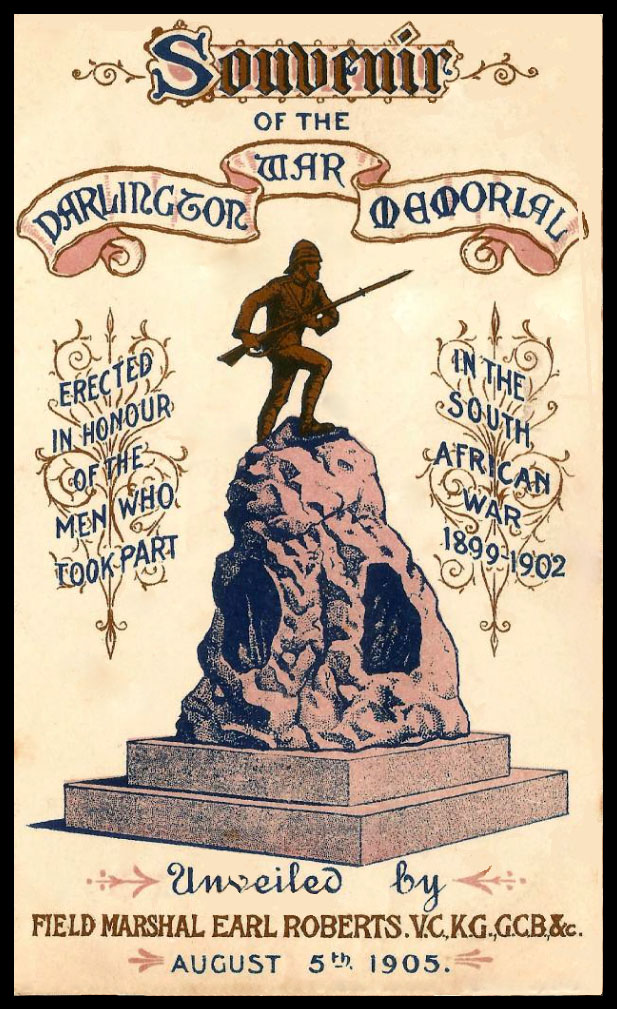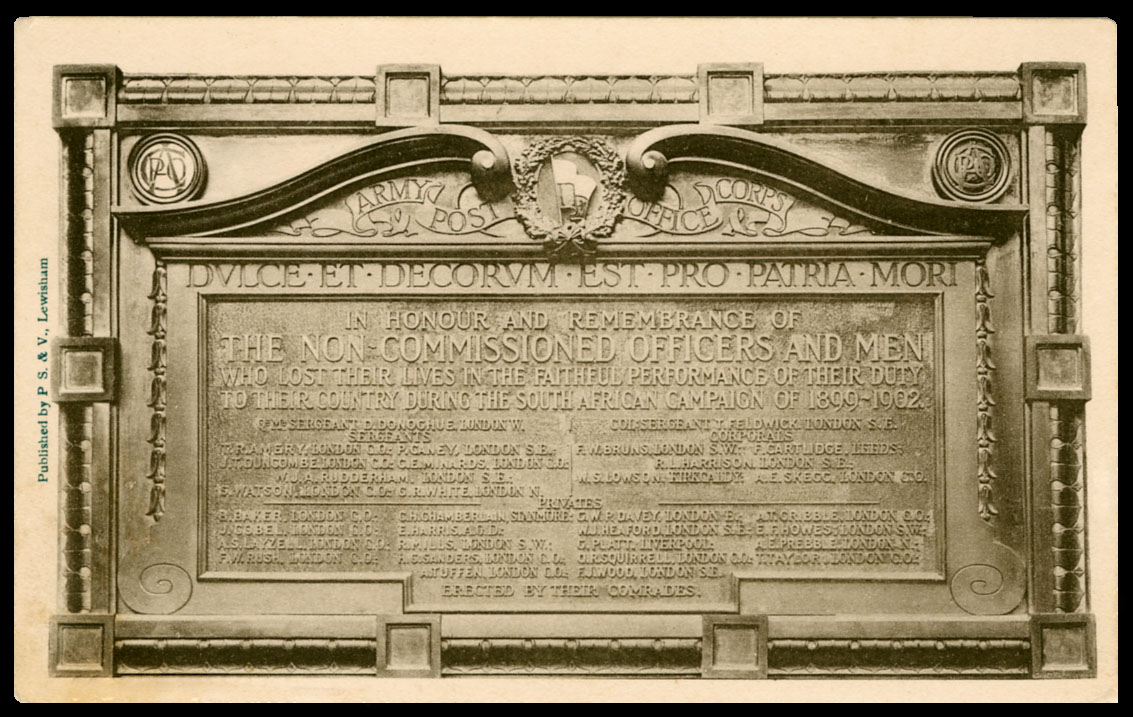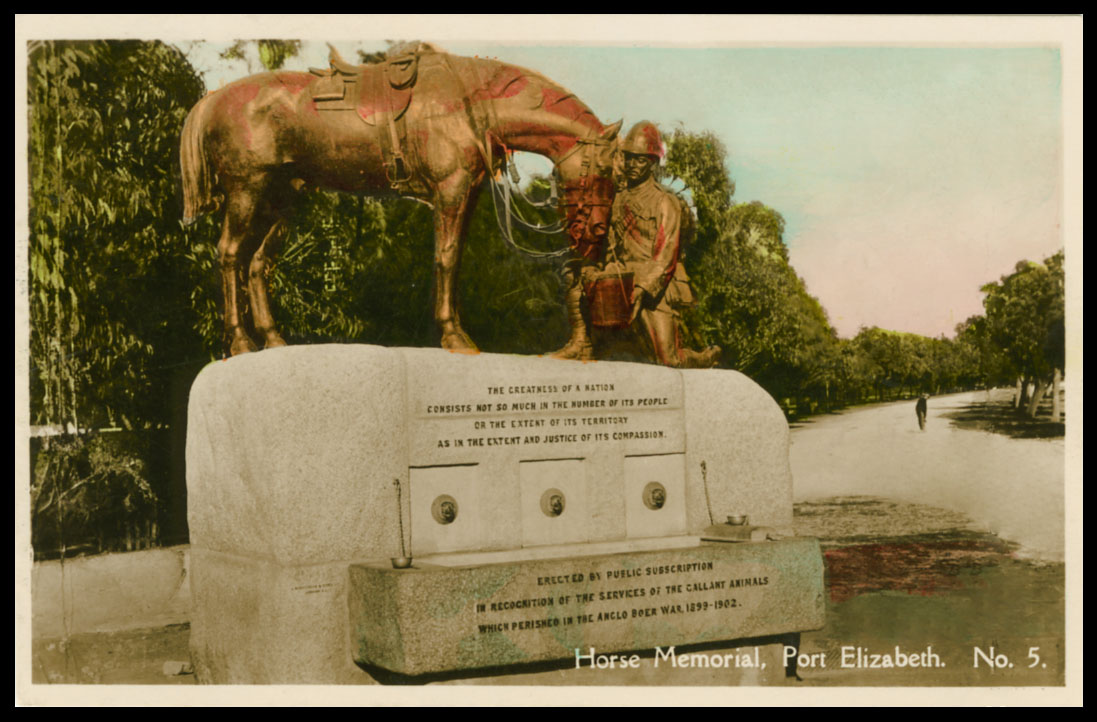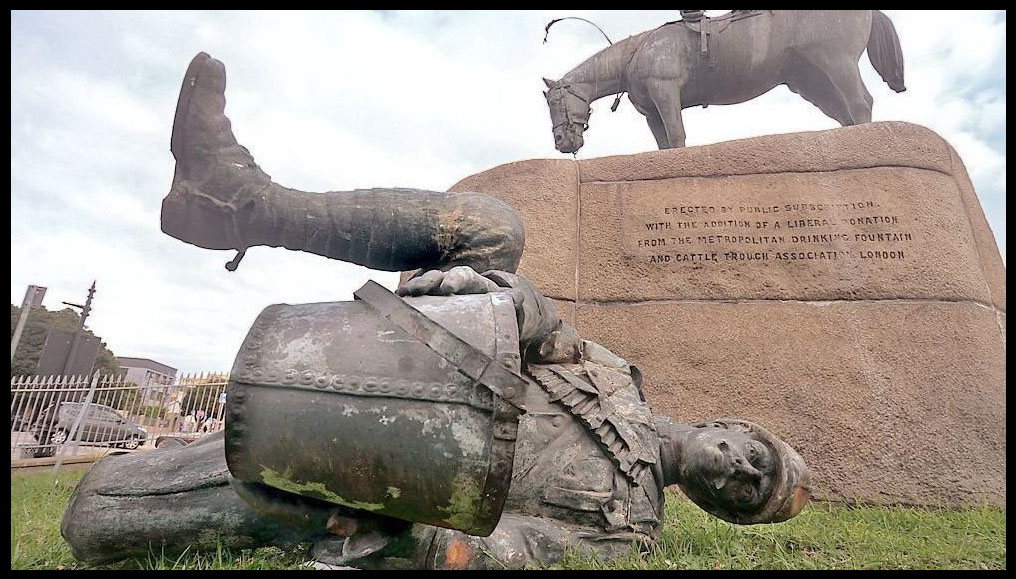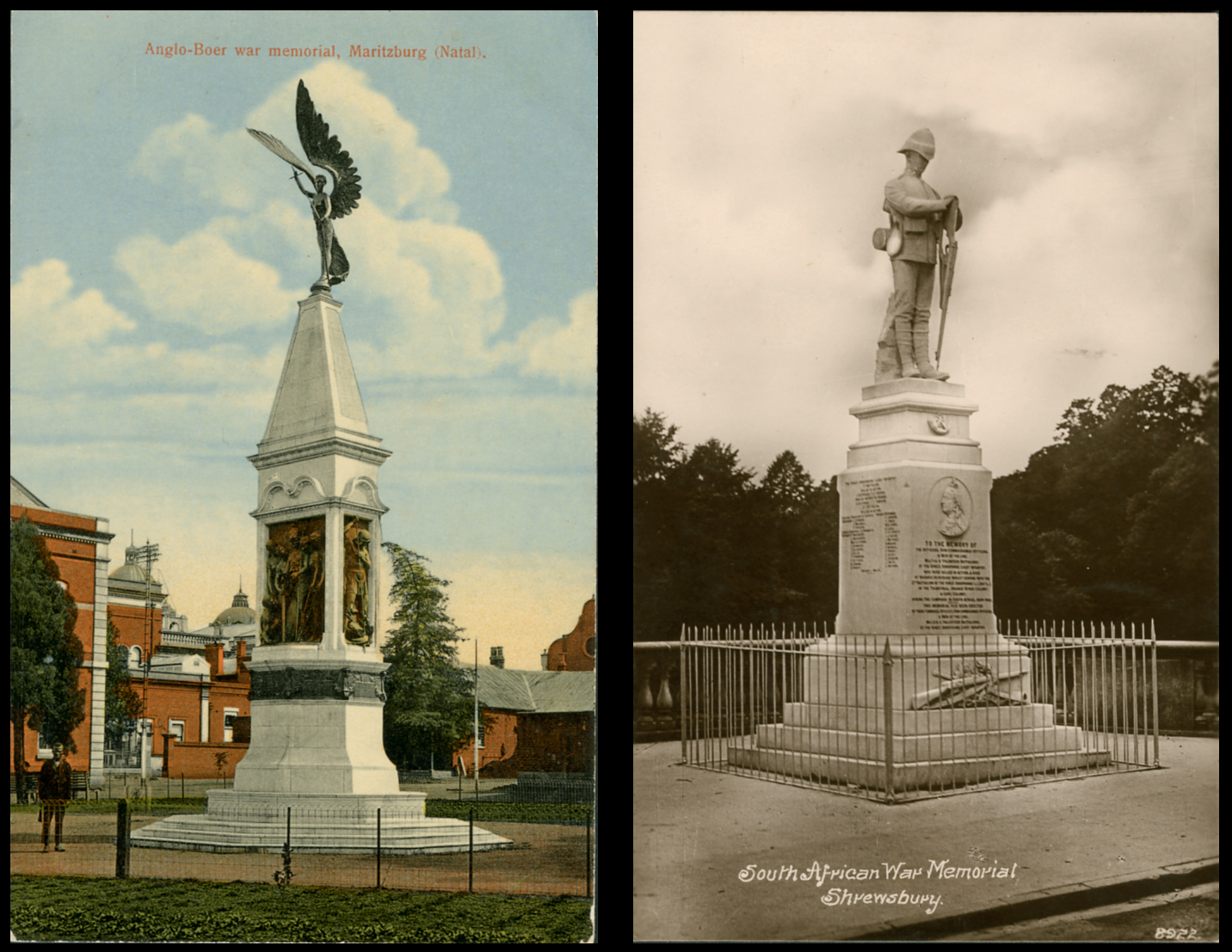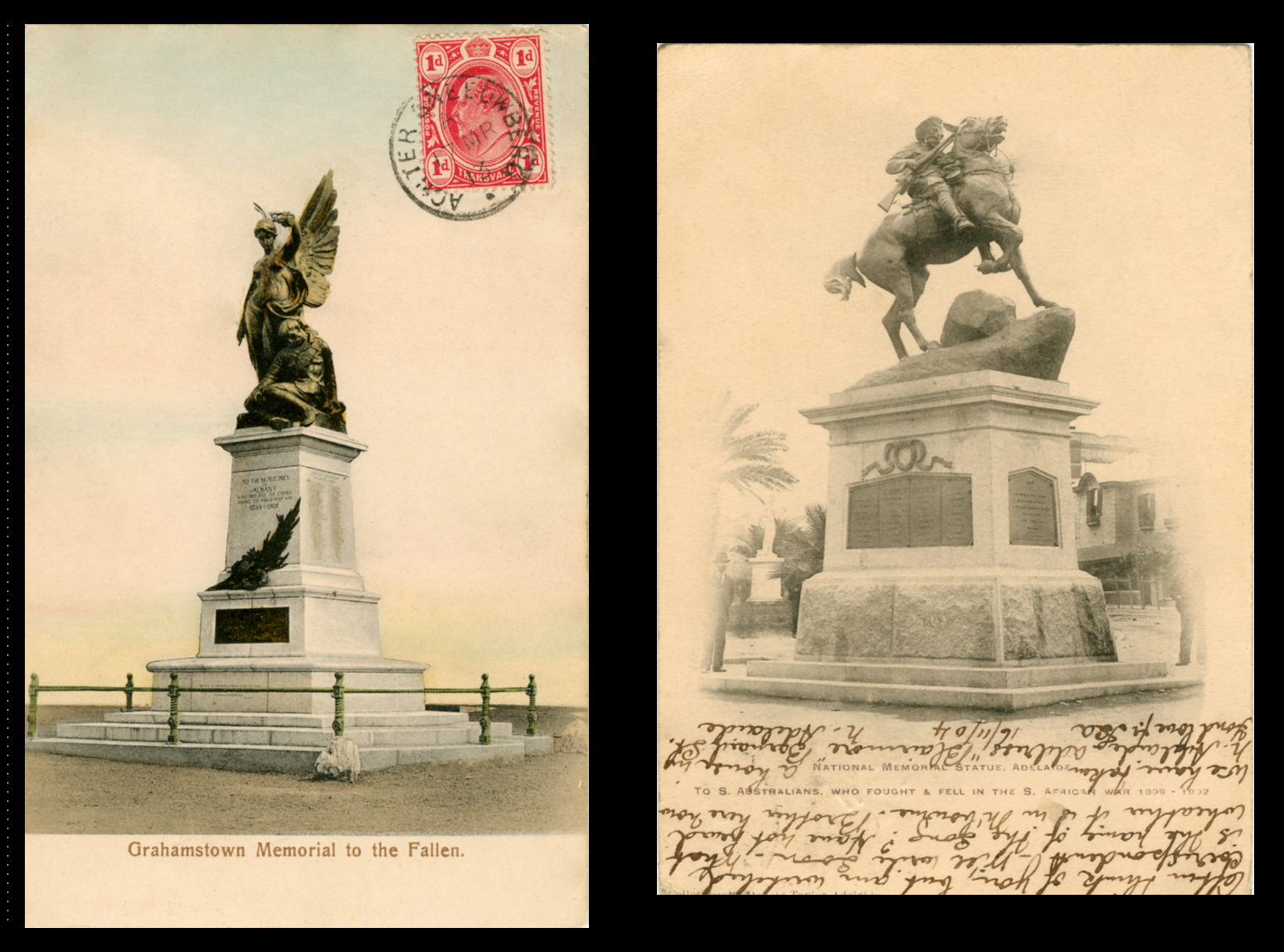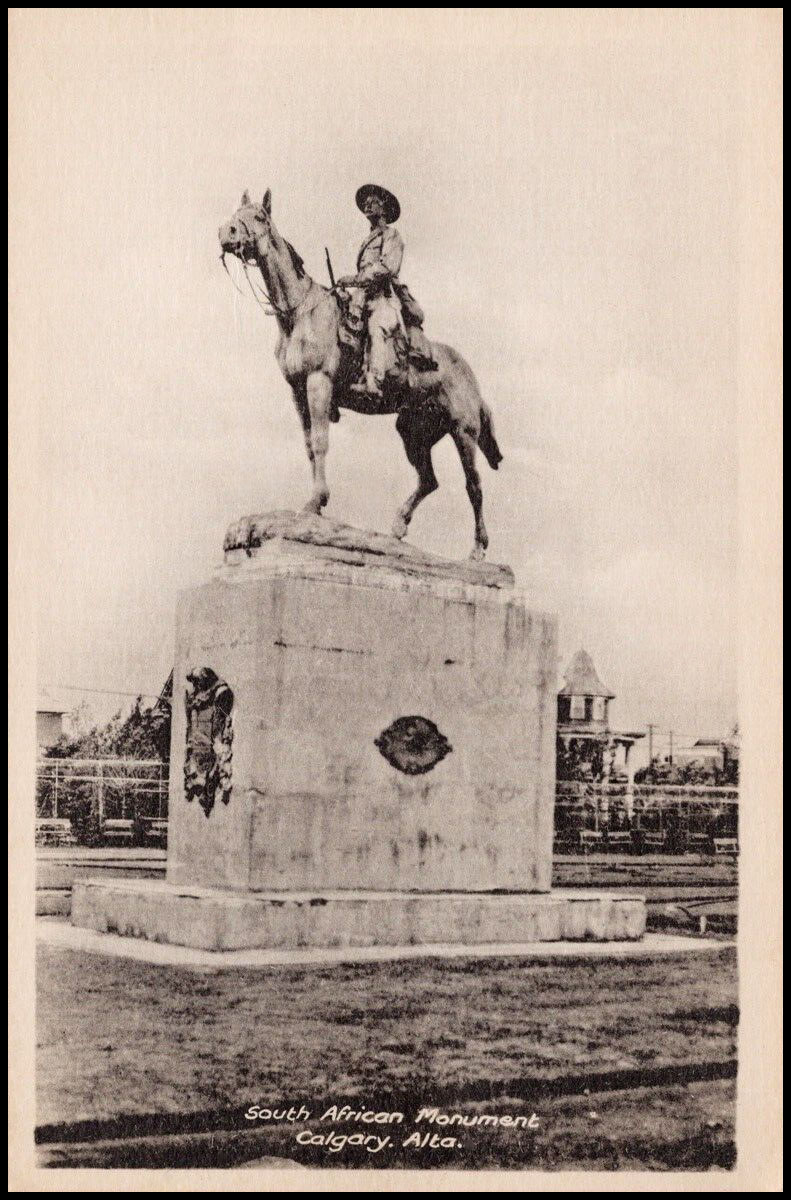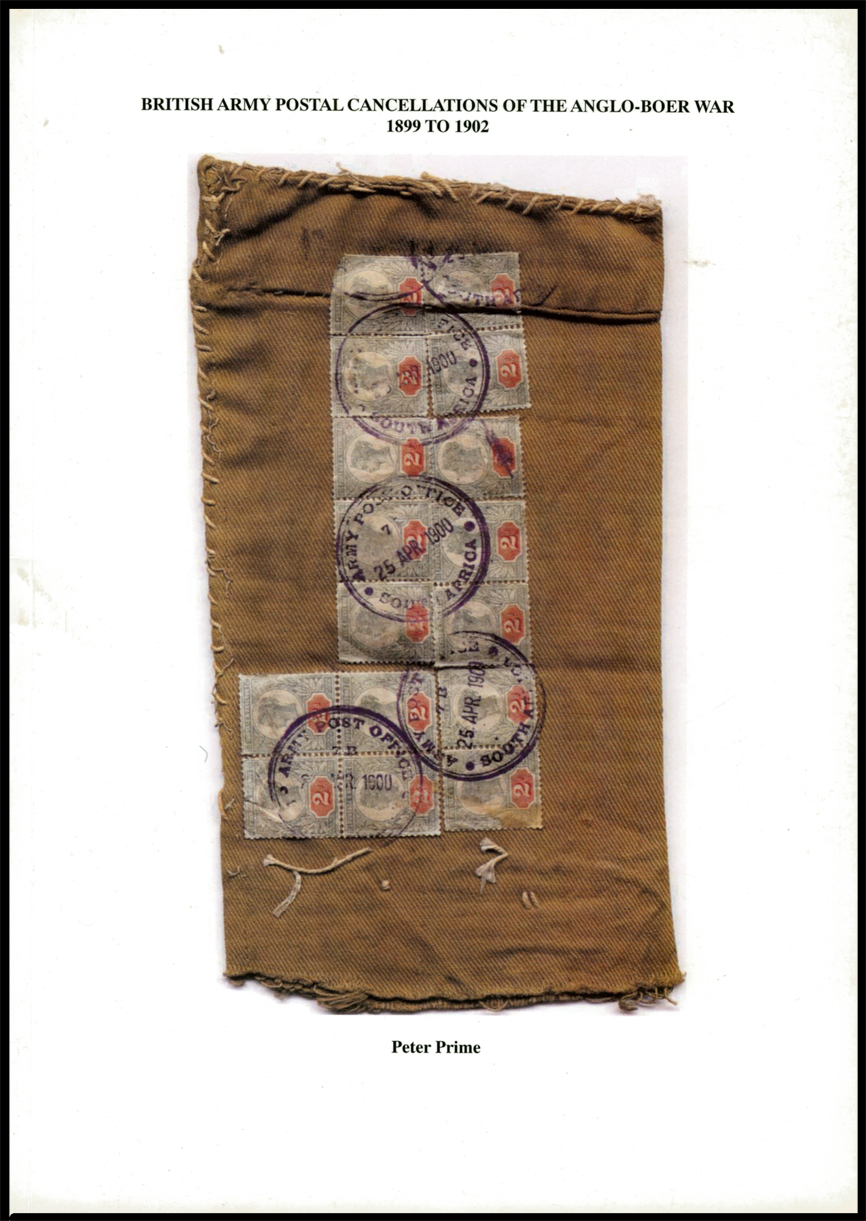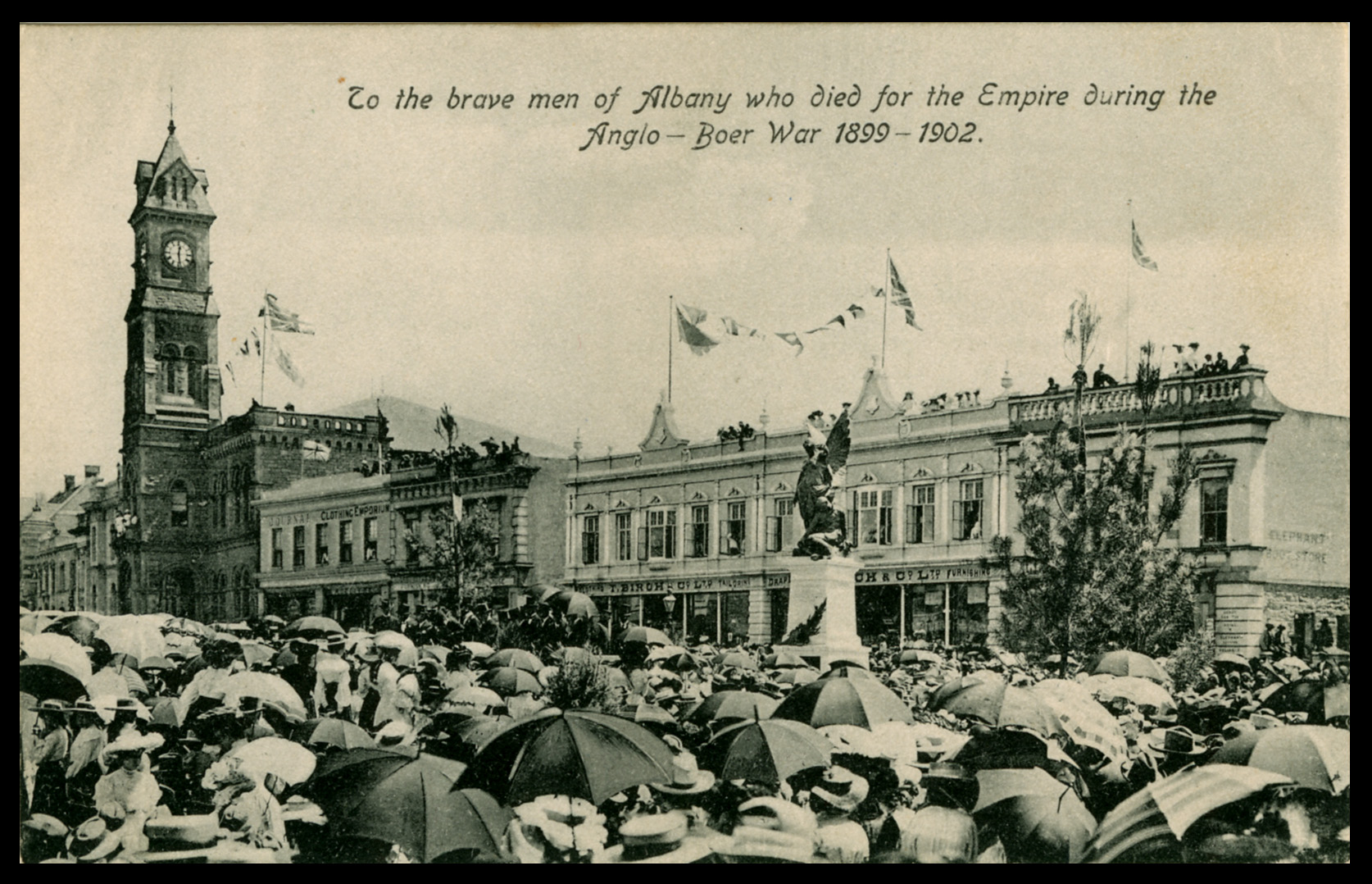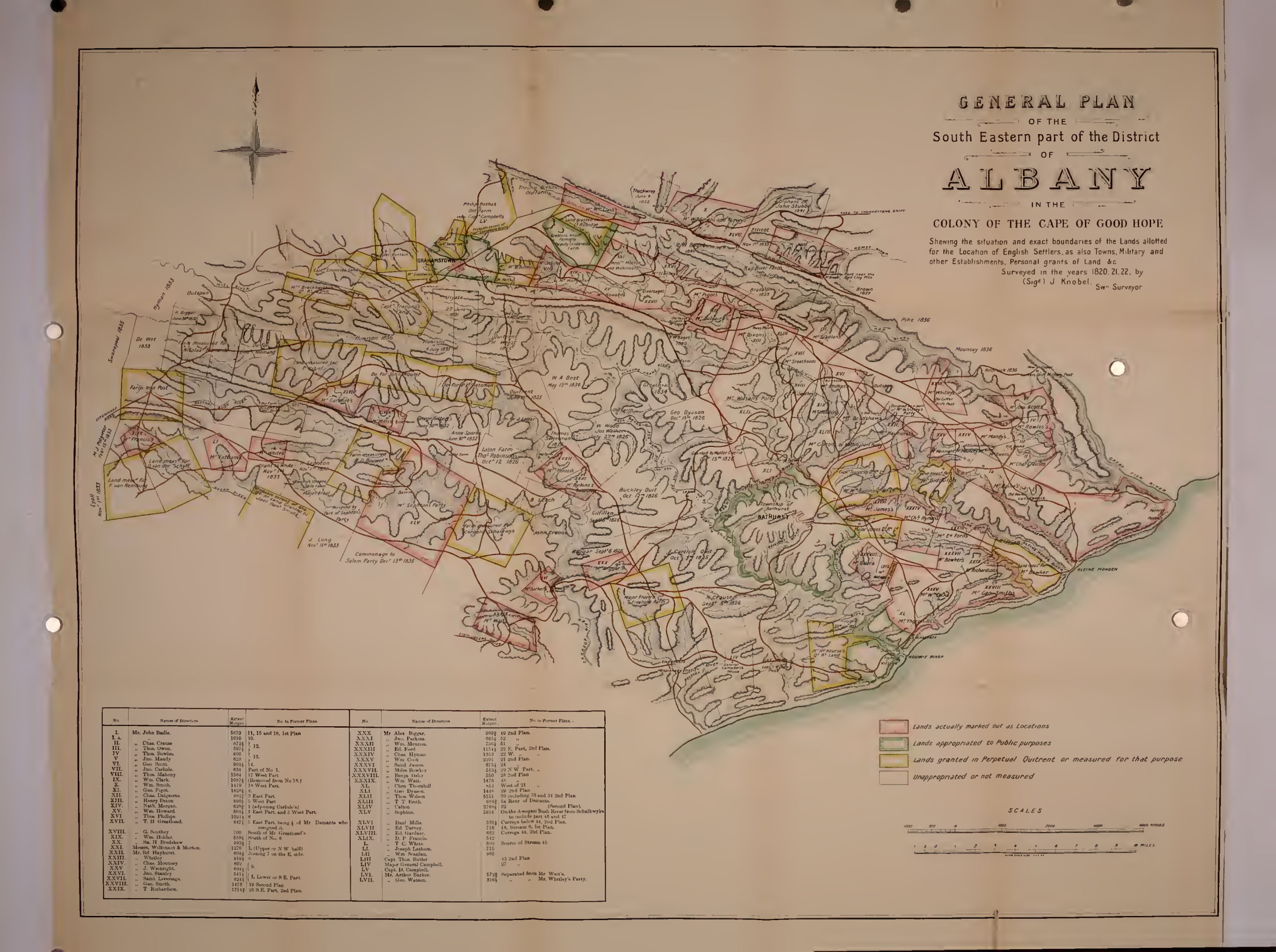'The Anglo-Boer War' - Apartheid's Last Hurrah!
Quote from Steve on January 3, 2023, 12:29 pmIn 1985 I bought a copy of Bill Nasson's 'Abraham Esau - A Calvinia Martyr in the Anglo-Boer War', (W. R. Nasson &* J. M. John, Social Dynamics, Volume 11.)* at the CNA in Cape Town. There was a constant hint of teargas and insurrection in the air. Coming out of the darkness at night from the far side of town one heard the muffled rattle of small arms fire, even the thump of grenade explosions. What was going on? Asleep in their beds, most suburbanites dreamed on, unaware of the reality of social change and resistance to the Apartheid state on the other side of town, just across the railway lines. motorways and industrial areas that Apartheid used as barriers to divide the city and its people.
The aim of Nasson / John's article in Social Dynamics was to create a Black hero fighting Boer racism, a role model for those involved in the anti-Apartheid 'struggle'. In doing so they ignored Esau's support for British imperialism, presumably the lesser evil. (Esau was an enfranchised, property-owning, self-employed transport driver ie. he was an empowered stakeholder in the liberal Cape.) Most importantly, their article made the point that the 'Anglo-Boer War' was not a conflict restricted to Anglos and Boers only. It showed that some Black people took a stand and participated in it as heroes, not just as victims. They gave support to both sides, out of a sense of loyalty to a liberal Empire, (as in Esaus's pro-British stand), or out of a obedience based on generations of master/servant relationships, (one typical of every commando's Black agterryers who, if truth be told, often had little or no choice in acting as squires to the Boer mounted infantry). While I have no exact figures to draw on, it is plausible that as many Black men served the Boers commados in non-combatant roles as there were Boers in the field. It is well-known that the British employed Black South Africans as spies, informants, (as in Esau's case), messengers, labourers, drivers and guards, etc., even arming some, especially as sentries in blockhouses at night.
I was so taken with Nasson / John's aricle on the life and death of Abrham Esau that I visted the National Army Museum to check its references. I was shocked and disappointed to discover many were faked. "All for a good cause", I thought. Despite the mix of fact and fiction in Nasson / John's spurious and tendentious article on Esau's war of resistance in Calvinia, it had the effect of being the first to make me aware that the 'Anglo-Boer War' was not as its name suggests the exclusive 'White Man's War' of my White South African Christian National education. This was a war fought in a country where the great majority of the population was Black, some 65% in 1902. It is very difficult to imagine that the lives of Black people were not affected by the operations of a British Army comprising some 400,000 'Anglo' men supported by Black non-combatant auxillaries supporting the campaign against Boer guerillas in rural areas.
Various atrocities perpetrated by both Boer and Brit, like the displaced rural Blacks, some 17,000 or so who died in British concentration camps, rounded up more for use as labourers on the system of blockhouse and barbed-wire fortifications than for any concern about their general security. Indeed, many Blacks were shot out of hand by Boers as they attempted to maintain their ancient rule by fear, as at Leliefontein in the Northern Cape where 'cheeky' mission station 'Hottentots' acted defiantly in protection of the British Cape and nearly killed the invading ZAR / Transvaal Boer 'general' Manie Maritz. If one looks one finds ample proof that Black South Africans also participated in the conflict as victims. The heroic story of the three siege towns contains ugly chapters on the treatment of their Black inhabitants by practical but bloody-minded British officers. One should also recall the 300 Basuto horsemen who chased Smuts' commando across the Orange River (Commando. Denys Reitz) and the Battle of Holkrantz (6 May 1902) , near Vryheid in which a Zulu impi launched a nighttime attack that killed 56 Boer raiders for a similar loss to themselves.
Of course, subversive events like these where Black South Africans defied the White racist staus quo, were always downplayed in popular histories of the war, especially ones where the 'Anglo-Boer War' was increasingly central to White South African identity. As a result, various post-war histories of the so-called 'Anglo-Boer War' contain many omissions, all deliberatly intended to hide the full scale of the participation of all of South Africa's people in what was an anti-imperialist struggle with a racist backstory. Not to put to fine a point on it but both the Boers and the Brits were racists in the sense that while they saw themselves as different to each other they viewed themselves collectively as different to Black South Africans who with few exceptions they regarded as inferior in every sense
Over time, the term 'Anglo-Boer War' established the myth of a White 'South African' based on the political and physical marriage of Boer and Brit post 1910 (Union). Indeed, I am a 'South African' from that era with a grandfather, a Royal Engineer in the Imperial Garrison from Dover, Kent, and an 'ouma' from Calvinia with a Cape Rebel brother. My grandparents married in 1916.
In terms of my limited research the term 'Anglo-Boer War' is first recorded used in London by Lady E. C. Briggs in 1901. In the immediate post-war years this name for the war became widely used in South Africa, most especially and almost exclusively so by English-speakers in the four British colonies that later comprised the Union of South Africa. From the time the war ended in 1902 up until Union in 1910, the term 'South African War' was not as widely used in South Africa as 'Anglo-Boer War'. In the combatant 'Anglo' nations of the Empire, Britain, Canada, Australia and New Zealand the term 'South African War' was largely adopted and used.
While 'South African War' can clearly be seen on a majority of their monuments to their 'Glorious Dead ' some limited use of 'Anglo-Boer War' and other names, like "The Campaign in South Africa' or 'Boer War' also occurred in these 'Anglo' countries in the years after the war. However, none of these names were as commonly used as 'Anglo-Boer War' in White South Africa which had a greater emphasis on race, segregation and the exclusion of Black people from the history of the war of 1899 - 1902. It was no coincidence that the myth of the 'Anglo-Boer War' as a 'White Man's War' developed in racist South Africa. The choice of 'Anglo-Boer War' was a act of segregationist exclusivity as physical as any Apartheid era 'Whites Only' sign. So, how did the use of this term come about?
When most people consider the history of South Africa, they see it as a conflict between Black and White. As a broad generalisation that is true. However, what most people neglect is that ever since Britain occupied the Cape for the second time in 1806 mistrust had developed between White and White, between English-speaking imperialist and colonialist Brits and Dutch republican-minded Boers. With English made the official language of Cape government, the courts and education, the emergent Afrikaner nation trekked away to find land and liberty in the interior far from the 'verdomde Engels'. (Afr. damned English.) But Britain doggedly pursued its errant colonists and plagued them mercilessly once gold was discovered. By the late 1890s, Great Britain led by England was at the height of is Imperial power.The settlers of British stock in the colonies enjoyed an arrogant assumptive sense of British racial superiority. It was not just South Africa that they ruled but the entire world. The brief post-war Edwardian era would perpetuate its self-perceived grandeur.
Following the discovery of diamonds and gold, South Africa became a 'get-rich quick' destination for European, mostly British settlers. The newly arrived English-speaking Uitlanders (Afr. 'foreigners') come to work on the Boer's goldfields regarded the Dutch-speaking farming community as ignorant country bumpkins, Dutchmen, dirty Japies, back-veld Boers and worse. As Afrikaner nationalism developed, the perceived 'Boerhaat' of the English (Afr. hatred of Boers), became one of its strident clarion calls. The British believed that the Boer Republicans stood in the way of progress, specifically the exploitation of southern Africa by British and international capital. The Boers mistrusted the English, remembered their history and wanted to keep their Republican independence at all costs. The two sides' dislike for each other was made worse by the long, bitter, humiliating and exhausting South African War of 1899 - 1902.
Ultimately Britain and its Empire prevailed. However, victory came with a recognition that Union, Britain's long-held political goal for southern Africa, would require English-speaking South Africans to share power with the majority Boers. A peace agreement would have to include the Boers who made up the majority of the White South African population. If there was one thing the Boers and English South Africans could agree on it was that they both wanted the Black South African majority to remain politically powerless. However, for the British power-sharing with the old Boer enemy was fraught with risk unless a majority of them could be made Empire Loyalists. In victory the English-speaking community in South Africa trumpeted the Empire's virtues and its tribal (Anglo) superiority over the Boers. These Anglo South African Loyalists raised memorials to the fallen in what they called the 'Anglo-Boer War'. The Boers did not call it the Anglo-Boer War. They called it the 'Second War of Freedom'. (They had won their country back from the British in 1881!)
Throughout the run-up to Union Britain and its Empire erected memorials to the Glorious Dead of the 'South African War'. In South Africa the adoption of 'Anglo-Boer War' as a description of this conflict was a decision made by the leaders of South Africa's insecure minority White English-speaking community. While these South African Anglo imperialaists had no choice but to go along with the terms of Britain's imperial peace treaty with the Boers, they still had the independence to determine the name of the war and to use this as a stick with which to remind the Boer community that while they represented the 'White South African' majority, English-speaking South Africans had the Anglophone world on their side,the greatest Empire ever known. (Hidden in this was the admission by English-speaking South African loyalists that they could not beat the Boers by themselves. They needed the Empire to do so.)
By 1910 the Boers agreed to surrender their republican independence in exchange for a Union that excluded Black South Africans. The British agreed to this. In fact they had no choice as the English-speaking colonists demanded the same thing, albeit less forthrighly. Two ex-Boer Generals, Louis Botha and Jan Smuts, formed the first post-Union government. Much was made of this marriage between Boer and Brit and the birth of a new nation of 'White South Africans'. After Union and during the honeymoon period for Boer and Brit came South Africa's first scarring acts of formal segregation, the Native Land Act, the Whites Only Union Defence Force, etc., etc., etc. In interpreting the emergence of this new nation, South African historians spun the heroic yarn and myth of the 'Anglo-Boer War' as the anvil on which White South Africa forged itself as a new race of men, one occupying 92% of the land. While The Boers did not refer to the war as the 'Anglo-Boer War', they took pride in its implicit fact that it was they alone who had fought the Anglo Empire.
Botha's and Smuts' time in office would be marked by their loyalty to the Empire. When WW1 broke out, they made the decision to invade German South West Africa despite knowing that this was going to be unpopular with die-hard Republicans. It led to a rebellion in South Africa which they loyally crushed before completing their conquest of GSWA, the only colonially led campaign of WW1 and its the first successful British one. It was the victory of the Empire's 'White South Africa'. The Anglos and the Boers had triumphed together but slowly over time the bitterness of the failed rebellion would see the balance of power in South Africa shift from Imperial Loyalties to Republican Nationalism. As South Africa transitioned slowly away from total Imperial fealty unquestioning 'historians' and others regurgitated the'Anglo-Boer War' as a 'White Man's War'. Increasingly, the 'Anglo-Boer War' became pro-Nationalist, pro-Republican, pro-Apartheid, 'Whites Only' propaganda. Ultimately, this would have a devastating negative effect on how Black South Africans viewed the war and any participation by their ancestors in it.
While I am not qualified to talk about the Black South African experience of Apartheid, it is evident that it has led many to conclude that the Anglo-Boer War was a colonial White Man's War from which racist South African history excluded them. As such, the term 'Anglo-Boer War' is a brutal reminder of all that is rotten about racist South African colonial and imperial history. One should not be surprised when Black South Africans destroy these monuments as an act of political protest or retribution. Many feel that they have no investment in this history. They have a point. Sadly, such is the legacy of Apartheid. It deliberately divided people into separate cultural identities and failed to teach a full and inclusive history. We are more likely to see more of these monuments to a 'White Man's War' destroyed than saved.
Today, I am of the opinion that the term 'Anglo-Boer War is an offensive anachronism whose use, like that of racist pejoratives, should be proscribed except when used in a historical context.
************
When Britain created the Union of South Africa in 1910 it placed political power in the hands of 'Boers' and British settlers, thereby creating an illusion for segregationists called 'White South Africa'. This fantasy had at its heart a myth based largely on the Boer's Great Trek and the 'Boer War', a phrase commonly used in Britain and popularised by Conan Doyle in 'The Great Boer War' (1902). This term continued to be used by a many British historians, like Thomas Pakenham, ('The Boer War', 1979). However, what is significant is that the term 'South African War' continued to enjoy widespread use in the UK. It is seen on almost all post-war British war memorials. It is only relatively recently that 'Anglo-Boer War' has gained any traction in the UK, the result of South Africa's near exclusive use of it.
The difference between Britain and South Africa's choice of name in the immediate aftermath of the war is clearly seen in Richard Stroud RDPSA's "coffee table book", the unfortunately named 'Memorials to the Fallen in the Anglo-Boer War 1899 - 1902,' (The Anglo-Boer War Philatelic Society. 2021). It unintentionally highlights the extraordinarily stark and remarkable difference between Britain's choice of 'South African War' on its memorials and South Africa's use of 'Anglo-Boer War'. Perhaps many will not see it like that but for me, as someone who grew up there a long time ago and who was made to listen to racist justifications for all manner of thngs, it is hard not to see the unsubtle hand of South Africans making segregationist propaganda out of the use of 'Anglo-Boer War'. It was even said by my teachers to be 'the last White Man's War', one fought in Africa with no Black people as combatants or victims.
Both sides made extensive well-documented use of Black auxillaries, almost every Boer having an 'agetr-ryer', a sort of Black squire to do their menial work. Thousands were used as labourers by both sides. That they did not participate in the fighting with a rifle in hand (some did!) did not prevent them from being shelled at long rage, shot at and if captured, badly treated or summarily executed. The Empire Loyalist spy Abraham Esua was beaten senseless, then shot. The British did arm blacks, especially as town guards. Their loyalty was unquestioned and greatly resented by the Boers. Denys Reitz describes how Smuts' commando was chased by Basuto horsemen. My great-uncle participated in the Leliefonten massacre where Blacks were killed for defying and resisting Boer authority in the Cape. Over 16, 0000 Blacks died in concentration camps. The British Army rounded up thousands to work as forced labour buiding defences along railway lines. It was slavery by another name. Some say as many as 120,000 were relocated and imprisoned in camps as labourers. At Holkrantz the Zulus slaughtered a large part of a sleeping Boer commando9s. The list could go on but for White South Africa's great racist reluctance to fully document Black participation in what it wanted to preserve as a 'White Man's War', one fought solely between Anglos and Boers, the 'Anglo-Boer War'.
In my capacity as editor of the South African Philately Club I recognise that the war of 1899 - 1902 affected all of South Africa's people, not just 'Anglos' and Boers. Consequently, I will no longer accept use the term 'Anglo-Boer War' except where it is used in a historical context. Our emerging editorial style sheet requires the use of the broader, more inclusive 'South African War' in any discussion about aspects of this conflict. Historic displays which reference the anachronistic term 'Anglo-Boer War', like Stroud's book, can be presented on this web site subject to a qualification that use of the term ignores the experience of all of South Africa's people in this conflict and as such it is misleading and out-of-date. I realise this will annoy some people. I advise them to get over their cherished delusions.
*Nasson and John's article contains spurious references unsubstantiated by the National Army Museum. Parts of it were little more than a fabricated 'Boy's Own' yarn intended to create a South African War Black resistance figure as a role model during the height of the Anti-Aparthed Struggle. Nasson and John's article and the reasons he wrote it have become history. At the time I chose not to challenge the accuracy of his article because I sympathised with his political motivation. Interestingly and deservedly so, Nasson is a well-regarded historian today, one who now uses 'South African War' almost exclusively. Clearly his penny dropped long before mine! The time has now come to write about Nasson and John's article as a curious and interesting item of fake South African history.
Images
1]. Richard Stroud RDPSA's "coffee table book", 'Memorials to the Fallen in the Anglo-Boer War 1899 - 1902', available from him and or the Anglo-Boer War Philatelic Society. (Copyright 2021. John Richard Stroud. The Anglo-Boer War Philatelic Society.) This British book clearly reveals a prefernce for use of the term 'Anglo-Boer War' in SA as opposed to the greater use of 'South African War' in GB, its Empire and Commonwealth today.
2]. Souvenir of the Unveling of the Darlington War Memorial in 1905 erected "in Honour of the Men who Took Part in the South African War".
3]. Army Post Office Corps Plaque of 1904 to the "men who lost their lives ... during the South African Campaign". This was another common war descriptor in the years before and after the the First World War.
4]. Port Elzabeth's wonderful Horse Memorial erected 1905 "in recognition of the gallant animals which perished in the Anglo-Boer War". It is one of only a handful of statues worldwide that commemorates horses in warfare. A national treasure!
5]. Damage to Port Elizabeth's Horse Memorial by politically motivated activists. Richard Stroud RDPSA says in his book, "The memorial was severely vandalised on 6th April 2015 by a group from the ANC's "Economic Freedom Fighters" (EFL) (sic) who partly dismanteed it, throwing the soldier to the ground. The E.F.L. later claimed responsibility". Stroud, an acclaimed 'Anglo-Boer War' historian, is wrong in his contemporary comment. The EFF is not nor was a part of the ANC ( African National Congress). Julius Malema, the leader of the EFF, is an expelled ANC Youth League President who founded it as a new political party in 2013.
Would this 'vandalism' have happened if the perpetrators had been given reason to believe that their ancestors had shared in the 'South African War' rather than being excluded from White South Africa's myth of an 'Anglo-Boer War'?
In 1985 I bought a copy of Bill Nasson's 'Abraham Esau - A Calvinia Martyr in the Anglo-Boer War', (W. R. Nasson &* J. M. John, Social Dynamics, Volume 11.)* at the CNA in Cape Town. There was a constant hint of teargas and insurrection in the air. Coming out of the darkness at night from the far side of town one heard the muffled rattle of small arms fire, even the thump of grenade explosions. What was going on? Asleep in their beds, most suburbanites dreamed on, unaware of the reality of social change and resistance to the Apartheid state on the other side of town, just across the railway lines. motorways and industrial areas that Apartheid used as barriers to divide the city and its people.
The aim of Nasson / John's article in Social Dynamics was to create a Black hero fighting Boer racism, a role model for those involved in the anti-Apartheid 'struggle'. In doing so they ignored Esau's support for British imperialism, presumably the lesser evil. (Esau was an enfranchised, property-owning, self-employed transport driver ie. he was an empowered stakeholder in the liberal Cape.) Most importantly, their article made the point that the 'Anglo-Boer War' was not a conflict restricted to Anglos and Boers only. It showed that some Black people took a stand and participated in it as heroes, not just as victims. They gave support to both sides, out of a sense of loyalty to a liberal Empire, (as in Esaus's pro-British stand), or out of a obedience based on generations of master/servant relationships, (one typical of every commando's Black agterryers who, if truth be told, often had little or no choice in acting as squires to the Boer mounted infantry). While I have no exact figures to draw on, it is plausible that as many Black men served the Boers commados in non-combatant roles as there were Boers in the field. It is well-known that the British employed Black South Africans as spies, informants, (as in Esau's case), messengers, labourers, drivers and guards, etc., even arming some, especially as sentries in blockhouses at night.
I was so taken with Nasson / John's aricle on the life and death of Abrham Esau that I visted the National Army Museum to check its references. I was shocked and disappointed to discover many were faked. "All for a good cause", I thought. Despite the mix of fact and fiction in Nasson / John's spurious and tendentious article on Esau's war of resistance in Calvinia, it had the effect of being the first to make me aware that the 'Anglo-Boer War' was not as its name suggests the exclusive 'White Man's War' of my White South African Christian National education. This was a war fought in a country where the great majority of the population was Black, some 65% in 1902. It is very difficult to imagine that the lives of Black people were not affected by the operations of a British Army comprising some 400,000 'Anglo' men supported by Black non-combatant auxillaries supporting the campaign against Boer guerillas in rural areas.
Various atrocities perpetrated by both Boer and Brit, like the displaced rural Blacks, some 17,000 or so who died in British concentration camps, rounded up more for use as labourers on the system of blockhouse and barbed-wire fortifications than for any concern about their general security. Indeed, many Blacks were shot out of hand by Boers as they attempted to maintain their ancient rule by fear, as at Leliefontein in the Northern Cape where 'cheeky' mission station 'Hottentots' acted defiantly in protection of the British Cape and nearly killed the invading ZAR / Transvaal Boer 'general' Manie Maritz. If one looks one finds ample proof that Black South Africans also participated in the conflict as victims. The heroic story of the three siege towns contains ugly chapters on the treatment of their Black inhabitants by practical but bloody-minded British officers. One should also recall the 300 Basuto horsemen who chased Smuts' commando across the Orange River (Commando. Denys Reitz) and the Battle of Holkrantz (6 May 1902) , near Vryheid in which a Zulu impi launched a nighttime attack that killed 56 Boer raiders for a similar loss to themselves.
Of course, subversive events like these where Black South Africans defied the White racist staus quo, were always downplayed in popular histories of the war, especially ones where the 'Anglo-Boer War' was increasingly central to White South African identity. As a result, various post-war histories of the so-called 'Anglo-Boer War' contain many omissions, all deliberatly intended to hide the full scale of the participation of all of South Africa's people in what was an anti-imperialist struggle with a racist backstory. Not to put to fine a point on it but both the Boers and the Brits were racists in the sense that while they saw themselves as different to each other they viewed themselves collectively as different to Black South Africans who with few exceptions they regarded as inferior in every sense
Over time, the term 'Anglo-Boer War' established the myth of a White 'South African' based on the political and physical marriage of Boer and Brit post 1910 (Union). Indeed, I am a 'South African' from that era with a grandfather, a Royal Engineer in the Imperial Garrison from Dover, Kent, and an 'ouma' from Calvinia with a Cape Rebel brother. My grandparents married in 1916.
In terms of my limited research the term 'Anglo-Boer War' is first recorded used in London by Lady E. C. Briggs in 1901. In the immediate post-war years this name for the war became widely used in South Africa, most especially and almost exclusively so by English-speakers in the four British colonies that later comprised the Union of South Africa. From the time the war ended in 1902 up until Union in 1910, the term 'South African War' was not as widely used in South Africa as 'Anglo-Boer War'. In the combatant 'Anglo' nations of the Empire, Britain, Canada, Australia and New Zealand the term 'South African War' was largely adopted and used.
While 'South African War' can clearly be seen on a majority of their monuments to their 'Glorious Dead ' some limited use of 'Anglo-Boer War' and other names, like "The Campaign in South Africa' or 'Boer War' also occurred in these 'Anglo' countries in the years after the war. However, none of these names were as commonly used as 'Anglo-Boer War' in White South Africa which had a greater emphasis on race, segregation and the exclusion of Black people from the history of the war of 1899 - 1902. It was no coincidence that the myth of the 'Anglo-Boer War' as a 'White Man's War' developed in racist South Africa. The choice of 'Anglo-Boer War' was a act of segregationist exclusivity as physical as any Apartheid era 'Whites Only' sign. So, how did the use of this term come about?
When most people consider the history of South Africa, they see it as a conflict between Black and White. As a broad generalisation that is true. However, what most people neglect is that ever since Britain occupied the Cape for the second time in 1806 mistrust had developed between White and White, between English-speaking imperialist and colonialist Brits and Dutch republican-minded Boers. With English made the official language of Cape government, the courts and education, the emergent Afrikaner nation trekked away to find land and liberty in the interior far from the 'verdomde Engels'. (Afr. damned English.) But Britain doggedly pursued its errant colonists and plagued them mercilessly once gold was discovered. By the late 1890s, Great Britain led by England was at the height of is Imperial power.The settlers of British stock in the colonies enjoyed an arrogant assumptive sense of British racial superiority. It was not just South Africa that they ruled but the entire world. The brief post-war Edwardian era would perpetuate its self-perceived grandeur.
Following the discovery of diamonds and gold, South Africa became a 'get-rich quick' destination for European, mostly British settlers. The newly arrived English-speaking Uitlanders (Afr. 'foreigners') come to work on the Boer's goldfields regarded the Dutch-speaking farming community as ignorant country bumpkins, Dutchmen, dirty Japies, back-veld Boers and worse. As Afrikaner nationalism developed, the perceived 'Boerhaat' of the English (Afr. hatred of Boers), became one of its strident clarion calls. The British believed that the Boer Republicans stood in the way of progress, specifically the exploitation of southern Africa by British and international capital. The Boers mistrusted the English, remembered their history and wanted to keep their Republican independence at all costs. The two sides' dislike for each other was made worse by the long, bitter, humiliating and exhausting South African War of 1899 - 1902.
Ultimately Britain and its Empire prevailed. However, victory came with a recognition that Union, Britain's long-held political goal for southern Africa, would require English-speaking South Africans to share power with the majority Boers. A peace agreement would have to include the Boers who made up the majority of the White South African population. If there was one thing the Boers and English South Africans could agree on it was that they both wanted the Black South African majority to remain politically powerless. However, for the British power-sharing with the old Boer enemy was fraught with risk unless a majority of them could be made Empire Loyalists. In victory the English-speaking community in South Africa trumpeted the Empire's virtues and its tribal (Anglo) superiority over the Boers. These Anglo South African Loyalists raised memorials to the fallen in what they called the 'Anglo-Boer War'. The Boers did not call it the Anglo-Boer War. They called it the 'Second War of Freedom'. (They had won their country back from the British in 1881!)
Throughout the run-up to Union Britain and its Empire erected memorials to the Glorious Dead of the 'South African War'. In South Africa the adoption of 'Anglo-Boer War' as a description of this conflict was a decision made by the leaders of South Africa's insecure minority White English-speaking community. While these South African Anglo imperialaists had no choice but to go along with the terms of Britain's imperial peace treaty with the Boers, they still had the independence to determine the name of the war and to use this as a stick with which to remind the Boer community that while they represented the 'White South African' majority, English-speaking South Africans had the Anglophone world on their side,the greatest Empire ever known. (Hidden in this was the admission by English-speaking South African loyalists that they could not beat the Boers by themselves. They needed the Empire to do so.)
By 1910 the Boers agreed to surrender their republican independence in exchange for a Union that excluded Black South Africans. The British agreed to this. In fact they had no choice as the English-speaking colonists demanded the same thing, albeit less forthrighly. Two ex-Boer Generals, Louis Botha and Jan Smuts, formed the first post-Union government. Much was made of this marriage between Boer and Brit and the birth of a new nation of 'White South Africans'. After Union and during the honeymoon period for Boer and Brit came South Africa's first scarring acts of formal segregation, the Native Land Act, the Whites Only Union Defence Force, etc., etc., etc. In interpreting the emergence of this new nation, South African historians spun the heroic yarn and myth of the 'Anglo-Boer War' as the anvil on which White South Africa forged itself as a new race of men, one occupying 92% of the land. While The Boers did not refer to the war as the 'Anglo-Boer War', they took pride in its implicit fact that it was they alone who had fought the Anglo Empire.
Botha's and Smuts' time in office would be marked by their loyalty to the Empire. When WW1 broke out, they made the decision to invade German South West Africa despite knowing that this was going to be unpopular with die-hard Republicans. It led to a rebellion in South Africa which they loyally crushed before completing their conquest of GSWA, the only colonially led campaign of WW1 and its the first successful British one. It was the victory of the Empire's 'White South Africa'. The Anglos and the Boers had triumphed together but slowly over time the bitterness of the failed rebellion would see the balance of power in South Africa shift from Imperial Loyalties to Republican Nationalism. As South Africa transitioned slowly away from total Imperial fealty unquestioning 'historians' and others regurgitated the'Anglo-Boer War' as a 'White Man's War'. Increasingly, the 'Anglo-Boer War' became pro-Nationalist, pro-Republican, pro-Apartheid, 'Whites Only' propaganda. Ultimately, this would have a devastating negative effect on how Black South Africans viewed the war and any participation by their ancestors in it.
While I am not qualified to talk about the Black South African experience of Apartheid, it is evident that it has led many to conclude that the Anglo-Boer War was a colonial White Man's War from which racist South African history excluded them. As such, the term 'Anglo-Boer War' is a brutal reminder of all that is rotten about racist South African colonial and imperial history. One should not be surprised when Black South Africans destroy these monuments as an act of political protest or retribution. Many feel that they have no investment in this history. They have a point. Sadly, such is the legacy of Apartheid. It deliberately divided people into separate cultural identities and failed to teach a full and inclusive history. We are more likely to see more of these monuments to a 'White Man's War' destroyed than saved.
Today, I am of the opinion that the term 'Anglo-Boer War is an offensive anachronism whose use, like that of racist pejoratives, should be proscribed except when used in a historical context.
************
When Britain created the Union of South Africa in 1910 it placed political power in the hands of 'Boers' and British settlers, thereby creating an illusion for segregationists called 'White South Africa'. This fantasy had at its heart a myth based largely on the Boer's Great Trek and the 'Boer War', a phrase commonly used in Britain and popularised by Conan Doyle in 'The Great Boer War' (1902). This term continued to be used by a many British historians, like Thomas Pakenham, ('The Boer War', 1979). However, what is significant is that the term 'South African War' continued to enjoy widespread use in the UK. It is seen on almost all post-war British war memorials. It is only relatively recently that 'Anglo-Boer War' has gained any traction in the UK, the result of South Africa's near exclusive use of it.
The difference between Britain and South Africa's choice of name in the immediate aftermath of the war is clearly seen in Richard Stroud RDPSA's "coffee table book", the unfortunately named 'Memorials to the Fallen in the Anglo-Boer War 1899 - 1902,' (The Anglo-Boer War Philatelic Society. 2021). It unintentionally highlights the extraordinarily stark and remarkable difference between Britain's choice of 'South African War' on its memorials and South Africa's use of 'Anglo-Boer War'. Perhaps many will not see it like that but for me, as someone who grew up there a long time ago and who was made to listen to racist justifications for all manner of thngs, it is hard not to see the unsubtle hand of South Africans making segregationist propaganda out of the use of 'Anglo-Boer War'. It was even said by my teachers to be 'the last White Man's War', one fought in Africa with no Black people as combatants or victims.
Both sides made extensive well-documented use of Black auxillaries, almost every Boer having an 'agetr-ryer', a sort of Black squire to do their menial work. Thousands were used as labourers by both sides. That they did not participate in the fighting with a rifle in hand (some did!) did not prevent them from being shelled at long rage, shot at and if captured, badly treated or summarily executed. The Empire Loyalist spy Abraham Esua was beaten senseless, then shot. The British did arm blacks, especially as town guards. Their loyalty was unquestioned and greatly resented by the Boers. Denys Reitz describes how Smuts' commando was chased by Basuto horsemen. My great-uncle participated in the Leliefonten massacre where Blacks were killed for defying and resisting Boer authority in the Cape. Over 16, 0000 Blacks died in concentration camps. The British Army rounded up thousands to work as forced labour buiding defences along railway lines. It was slavery by another name. Some say as many as 120,000 were relocated and imprisoned in camps as labourers. At Holkrantz the Zulus slaughtered a large part of a sleeping Boer commando9s. The list could go on but for White South Africa's great racist reluctance to fully document Black participation in what it wanted to preserve as a 'White Man's War', one fought solely between Anglos and Boers, the 'Anglo-Boer War'.
In my capacity as editor of the South African Philately Club I recognise that the war of 1899 - 1902 affected all of South Africa's people, not just 'Anglos' and Boers. Consequently, I will no longer accept use the term 'Anglo-Boer War' except where it is used in a historical context. Our emerging editorial style sheet requires the use of the broader, more inclusive 'South African War' in any discussion about aspects of this conflict. Historic displays which reference the anachronistic term 'Anglo-Boer War', like Stroud's book, can be presented on this web site subject to a qualification that use of the term ignores the experience of all of South Africa's people in this conflict and as such it is misleading and out-of-date. I realise this will annoy some people. I advise them to get over their cherished delusions.
*Nasson and John's article contains spurious references unsubstantiated by the National Army Museum. Parts of it were little more than a fabricated 'Boy's Own' yarn intended to create a South African War Black resistance figure as a role model during the height of the Anti-Aparthed Struggle. Nasson and John's article and the reasons he wrote it have become history. At the time I chose not to challenge the accuracy of his article because I sympathised with his political motivation. Interestingly and deservedly so, Nasson is a well-regarded historian today, one who now uses 'South African War' almost exclusively. Clearly his penny dropped long before mine! The time has now come to write about Nasson and John's article as a curious and interesting item of fake South African history.
Images
1]. Richard Stroud RDPSA's "coffee table book", 'Memorials to the Fallen in the Anglo-Boer War 1899 - 1902', available from him and or the Anglo-Boer War Philatelic Society. (Copyright 2021. John Richard Stroud. The Anglo-Boer War Philatelic Society.) This British book clearly reveals a prefernce for use of the term 'Anglo-Boer War' in SA as opposed to the greater use of 'South African War' in GB, its Empire and Commonwealth today.
2]. Souvenir of the Unveling of the Darlington War Memorial in 1905 erected "in Honour of the Men who Took Part in the South African War".
3]. Army Post Office Corps Plaque of 1904 to the "men who lost their lives ... during the South African Campaign". This was another common war descriptor in the years before and after the the First World War.
4]. Port Elzabeth's wonderful Horse Memorial erected 1905 "in recognition of the gallant animals which perished in the Anglo-Boer War". It is one of only a handful of statues worldwide that commemorates horses in warfare. A national treasure!
5]. Damage to Port Elizabeth's Horse Memorial by politically motivated activists. Richard Stroud RDPSA says in his book, "The memorial was severely vandalised on 6th April 2015 by a group from the ANC's "Economic Freedom Fighters" (EFL) (sic) who partly dismanteed it, throwing the soldier to the ground. The E.F.L. later claimed responsibility". Stroud, an acclaimed 'Anglo-Boer War' historian, is wrong in his contemporary comment. The EFF is not nor was a part of the ANC ( African National Congress). Julius Malema, the leader of the EFF, is an expelled ANC Youth League President who founded it as a new political party in 2013.
Would this 'vandalism' have happened if the perpetrators had been given reason to believe that their ancestors had shared in the 'South African War' rather than being excluded from White South Africa's myth of an 'Anglo-Boer War'?
Uploaded files:Quote from Steve on January 15, 2023, 6:02 pmUse of the 'South African War' in Britain and elsewhere as opposed to South Africa's historic use of largely 'Ango-Boer War' is quite remarkable. I will continue to place postcards here as I find them.
Where the year appears, this is the date when the PC was posted. No year equals 'unused PC'.
Below from top down.
"Anglo-Boer War" Pietermaritzburg; "South African War". Shrewsbury, England.
"Anglo-Boer War" Grahamstown 1913; 'South African War', Adelaide, South Australia 1904."South African War" Calgary, Alberta, Canada 1914. The monument reads: "To the Memory of the Brave Men of the Province of Alberta who in the South African War of 1899 - 1902 gave Their Lives for Their Country's Honour".
Use of the 'South African War' in Britain and elsewhere as opposed to South Africa's historic use of largely 'Ango-Boer War' is quite remarkable. I will continue to place postcards here as I find them.
Where the year appears, this is the date when the PC was posted. No year equals 'unused PC'.
Below from top down.
"Anglo-Boer War" Pietermaritzburg; "South African War". Shrewsbury, England.
"Anglo-Boer War" Grahamstown 1913; 'South African War', Adelaide, South Australia 1904.
"South African War" Calgary, Alberta, Canada 1914. The monument reads: "To the Memory of the Brave Men of the Province of Alberta who in the South African War of 1899 - 1902 gave Their Lives for Their Country's Honour".
Uploaded files:
Quote from Steve on January 22, 2023, 1:47 pmMy brother-in law was speaking to me about the Anglo Boer War Historical Society while I thought he meant the Anglo-Boer War Philatelic Society. This post outlnes these two societies. With no input from me, my brother-in-law, a Cambridge academic, has independently developed an awareness of the issues in this post. His view is that use of 'Anglo-Boer War' should now be discontinued.
The Anglo-Boer War Philatelic Society
Of most interest to postal historians is the 'Anglo-Boer War Philatelic Society'. This was founded in 1957, just nine years after the Apartheid Nationalist government in South Africa came to power promising White men a place in Africa for the next 1000 years. In 1957, Britain was a largely monocultural society of conservative views that very largely did not challenge imperial orthodoxies.
When the Anglo-Boer War Philatelic Society was founded 'Anglo-Boer War' had been White South Africa's first and seldom questioned choice of name for the war since the peace of 1902. The use of 'Anglo-Boer War' limited the conflict to a 'White Man's War' which was how most White South Africans wanted to remember it. Some even believed this was the case! I am not suggesting that the founders of the Anglo-Boer War Philatelic Society were racists. They were men of their time who went along with what they thought back then was a clinically correct and better way to describe a war between the British Empire, 'Anglos', and the two Republican states. Today, we know differently.
The Anglo Boer War Historical Society
This society was formed in December 2012. Given the large number of academics and professionals in this society, people you would expect to be 'woke', abreast of the time. One must ask why its founders chose this name for their society when there was already a debate developing about the continued suitability of the term 'Anglo-Boer War'? By 2012 some other historians already understood the issue and had committed themselves to not using 'Anglo-Boer War'. As the use of this term is not as widespread in Britain as South Africa, why did they choose to use it when curiously their web site address is "http://www.boerwarsociety.co.uk/"? I daresay they may have thought that on the basis of South Africa's lead in the almost exclusive use of the term 'Anglo Boer War' it was the way to go.
This society seems to be 'in bed' with a number of South Africans. As a word of caution, many elderly White South Africans are reactionary and angry with people who cause them to think about these issues more than they would like. Perhaps as this debate develops this society will be glad to be the 'Boer War Society'. As 'Boer' is a ancient pejorative in SA, 'Republican' is a much better fit when describing the people who were resisting British imperialism. As an imperial power, Britain was not fighting the idea of farming, it was fighting Republicanism.
My preference is for the Anglo Boer War Historical Society to use 'South African War', a truly British (Anglo) term in widespread use in the immediate aftermath of the war. The Anglo Boer War Historical Society website says that "Any thought provoking or controversial issues are tactfully examined". That being the case, I look forward to reading their views here. All comments, except racist ones, are welcomed. (That's not to say I think this society is racist! I have no reason to suspect that despite their use of 'Anglo-Boer War!)
IMAGE
Peter Prime's 'British Army Postal Cancellations of the ABW as published by the 'Anglo Boer War Philatelic Society'.
My brother-in law was speaking to me about the Anglo Boer War Historical Society while I thought he meant the Anglo-Boer War Philatelic Society. This post outlnes these two societies. With no input from me, my brother-in-law, a Cambridge academic, has independently developed an awareness of the issues in this post. His view is that use of 'Anglo-Boer War' should now be discontinued.
The Anglo-Boer War Philatelic Society
Of most interest to postal historians is the 'Anglo-Boer War Philatelic Society'. This was founded in 1957, just nine years after the Apartheid Nationalist government in South Africa came to power promising White men a place in Africa for the next 1000 years. In 1957, Britain was a largely monocultural society of conservative views that very largely did not challenge imperial orthodoxies.
When the Anglo-Boer War Philatelic Society was founded 'Anglo-Boer War' had been White South Africa's first and seldom questioned choice of name for the war since the peace of 1902. The use of 'Anglo-Boer War' limited the conflict to a 'White Man's War' which was how most White South Africans wanted to remember it. Some even believed this was the case! I am not suggesting that the founders of the Anglo-Boer War Philatelic Society were racists. They were men of their time who went along with what they thought back then was a clinically correct and better way to describe a war between the British Empire, 'Anglos', and the two Republican states. Today, we know differently.
The Anglo Boer War Historical Society
This society was formed in December 2012. Given the large number of academics and professionals in this society, people you would expect to be 'woke', abreast of the time. One must ask why its founders chose this name for their society when there was already a debate developing about the continued suitability of the term 'Anglo-Boer War'? By 2012 some other historians already understood the issue and had committed themselves to not using 'Anglo-Boer War'. As the use of this term is not as widespread in Britain as South Africa, why did they choose to use it when curiously their web site address is "http://www.boerwarsociety.co.uk/"? I daresay they may have thought that on the basis of South Africa's lead in the almost exclusive use of the term 'Anglo Boer War' it was the way to go.
This society seems to be 'in bed' with a number of South Africans. As a word of caution, many elderly White South Africans are reactionary and angry with people who cause them to think about these issues more than they would like. Perhaps as this debate develops this society will be glad to be the 'Boer War Society'. As 'Boer' is a ancient pejorative in SA, 'Republican' is a much better fit when describing the people who were resisting British imperialism. As an imperial power, Britain was not fighting the idea of farming, it was fighting Republicanism.
My preference is for the Anglo Boer War Historical Society to use 'South African War', a truly British (Anglo) term in widespread use in the immediate aftermath of the war. The Anglo Boer War Historical Society website says that "Any thought provoking or controversial issues are tactfully examined". That being the case, I look forward to reading their views here. All comments, except racist ones, are welcomed. (That's not to say I think this society is racist! I have no reason to suspect that despite their use of 'Anglo-Boer War!)
IMAGE
Peter Prime's 'British Army Postal Cancellations of the ABW as published by the 'Anglo Boer War Philatelic Society'.
Uploaded files:
Quote from Steve on March 22, 2023, 11:05 amBelow is a postcard showing the unveiling in Grahamstown, Cape Colony, in March 1906, by the Governor, Sir Walter Hely-Hutchinson of the Memorial "To the brave men of Albany who died for the Empire during the Anglo-Boer War 1899 - 1902". It shows early use of the phrase 'Anglo-Boer War' in South Africa at a time when Britain used 'South African War' or variations of it. If you can show examples of British use of 'Anglo-Boer War' from this time, please advise me.
This postcard is also shown in Richard Stroud RDPSA's fine "coffee table" book, "Memorials to the Fallen in the Anglo-Boer War' (page 71). Its preceding page shows two postcards of the Memorial erected in East London in 1908, one of which describes it as the "Volunteer Monument" while the other describes it as the "Anglo-Boer War Memorial" Stroud notes that it was "Vandalised in April 2015, white paint being thrown over it. Four men were involved". Again, one should not be surprised or indeed even offended by protests like this given that the colonists deliberately chose to use the term 'Anglo-Boer War' as a means of excluding all Black South African participation from the history of the war. When a people are excluded from history, they will have no option but to make their own version of events.
At the risk of undermining my argument and introducing an extra Empire versus Boer element to this debate, the term 'Albany' is interesting. It was given its name by Captain Kuyler, the hanging magistrate of Slagter's Nek notoriety. His family had lived in the Dutch 'New Amsterdam' since before it became British New York. During the American Revolutionary War Kuyler loyally sided with the British. By war's end he lost everything and fled to Canada where he joined the British Army who thought it a good idea to send him to the Cape. They hoped that being able to speak Dutch Kuyler would win over with the unhappy frontier Boers. Kuyler was appointed the local military magistrate in Uitenhage. Having lost everything to rebel colonists in America, he was in absolutely no mood to compromise with rebel Cape Dutchmen whom he hung. He named the surroundng area 'Albany' after his losts lands in upstate New York. Years later, after the discovery of diamonds, an attempt was made to create a buffer zone between the Griquas and the OFS Boers by filling the area with loyal Eastern Cape farmers from Albany. The area became known as 'Albania'.
The postcard below refers to Albany. The map is from 'British South Africa. A History of the Colony of the Cape of Good Hope from its Conquest 1795 to the Settlement of Albany by the British Emigration of 1819' (Colin Turing Campbell).
Below is a postcard showing the unveiling in Grahamstown, Cape Colony, in March 1906, by the Governor, Sir Walter Hely-Hutchinson of the Memorial "To the brave men of Albany who died for the Empire during the Anglo-Boer War 1899 - 1902". It shows early use of the phrase 'Anglo-Boer War' in South Africa at a time when Britain used 'South African War' or variations of it. If you can show examples of British use of 'Anglo-Boer War' from this time, please advise me.
This postcard is also shown in Richard Stroud RDPSA's fine "coffee table" book, "Memorials to the Fallen in the Anglo-Boer War' (page 71). Its preceding page shows two postcards of the Memorial erected in East London in 1908, one of which describes it as the "Volunteer Monument" while the other describes it as the "Anglo-Boer War Memorial" Stroud notes that it was "Vandalised in April 2015, white paint being thrown over it. Four men were involved". Again, one should not be surprised or indeed even offended by protests like this given that the colonists deliberately chose to use the term 'Anglo-Boer War' as a means of excluding all Black South African participation from the history of the war. When a people are excluded from history, they will have no option but to make their own version of events.
At the risk of undermining my argument and introducing an extra Empire versus Boer element to this debate, the term 'Albany' is interesting. It was given its name by Captain Kuyler, the hanging magistrate of Slagter's Nek notoriety. His family had lived in the Dutch 'New Amsterdam' since before it became British New York. During the American Revolutionary War Kuyler loyally sided with the British. By war's end he lost everything and fled to Canada where he joined the British Army who thought it a good idea to send him to the Cape. They hoped that being able to speak Dutch Kuyler would win over with the unhappy frontier Boers. Kuyler was appointed the local military magistrate in Uitenhage. Having lost everything to rebel colonists in America, he was in absolutely no mood to compromise with rebel Cape Dutchmen whom he hung. He named the surroundng area 'Albany' after his losts lands in upstate New York. Years later, after the discovery of diamonds, an attempt was made to create a buffer zone between the Griquas and the OFS Boers by filling the area with loyal Eastern Cape farmers from Albany. The area became known as 'Albania'.
The postcard below refers to Albany. The map is from 'British South Africa. A History of the Colony of the Cape of Good Hope from its Conquest 1795 to the Settlement of Albany by the British Emigration of 1819' (Colin Turing Campbell).
Uploaded files:Quote from Steve on October 27, 2025, 7:50 amGloucester Memorial, Clifton, Bristol
1913. Postcard. CYPHERGAT 'NO 16 13' to CYPHERGAT. (Gloucester Memorial, Clifton.)'.
Sadly, this high res image is not sharp enough to read the inscription on the memorial. However, the internet tells us exactly what it says. (I trust!). This is a curious memorial in terms of the names used to describe the war. Google begins by describing it as the "Boer War Memorial Gloucester Regiment", then calls it "Second Boer War (1899-1902)". It is located in Queens Road, Bristol.
Google says "This memorial commemorates the soldiers of the Gloucester Regiment who gave their lives in the Anglo-Boer War (1899-1902). Unveiled by Field Marshall Lord Roberts, V.C. K.G. on 4 March 1905. There are 251 names listed on the monument" which is inscribed "In memory of the Officers, Non-Commissioned Officers and Men of the Gloucestershire Regiment who gave their lives for their Sovereign and Country in the South African Campaign, 1888-1902. Erected by all ranks of the seven battalions of the regiment"
The 1st and 2nd battalions received battle honours for the Defence of Ladysmith, Relief of Kimberley, Paardeberg and South Africa 1899-1902 to add to its colours. The 3rd (Volunteer) and 4th (Militia) battalions were also awarded South Africa 1899-1902.
So in summary, Google calls the war both the Boer War and the Anglo-Boer but the memorial which was erected closest to the time of the conflict calls it "the South African Campaign". From this lack of clarity we can see the 'South African War' running alongside the 'South African Campaign' and the prejudiced 'Boer War' assuming its common and vulgar popularity. While the name 'Anglo-Boer War' did exist in a very minor way back then, its modern use was developed by historians with a political and racial axe to grind.
Gloucester Memorial, Clifton, Bristol
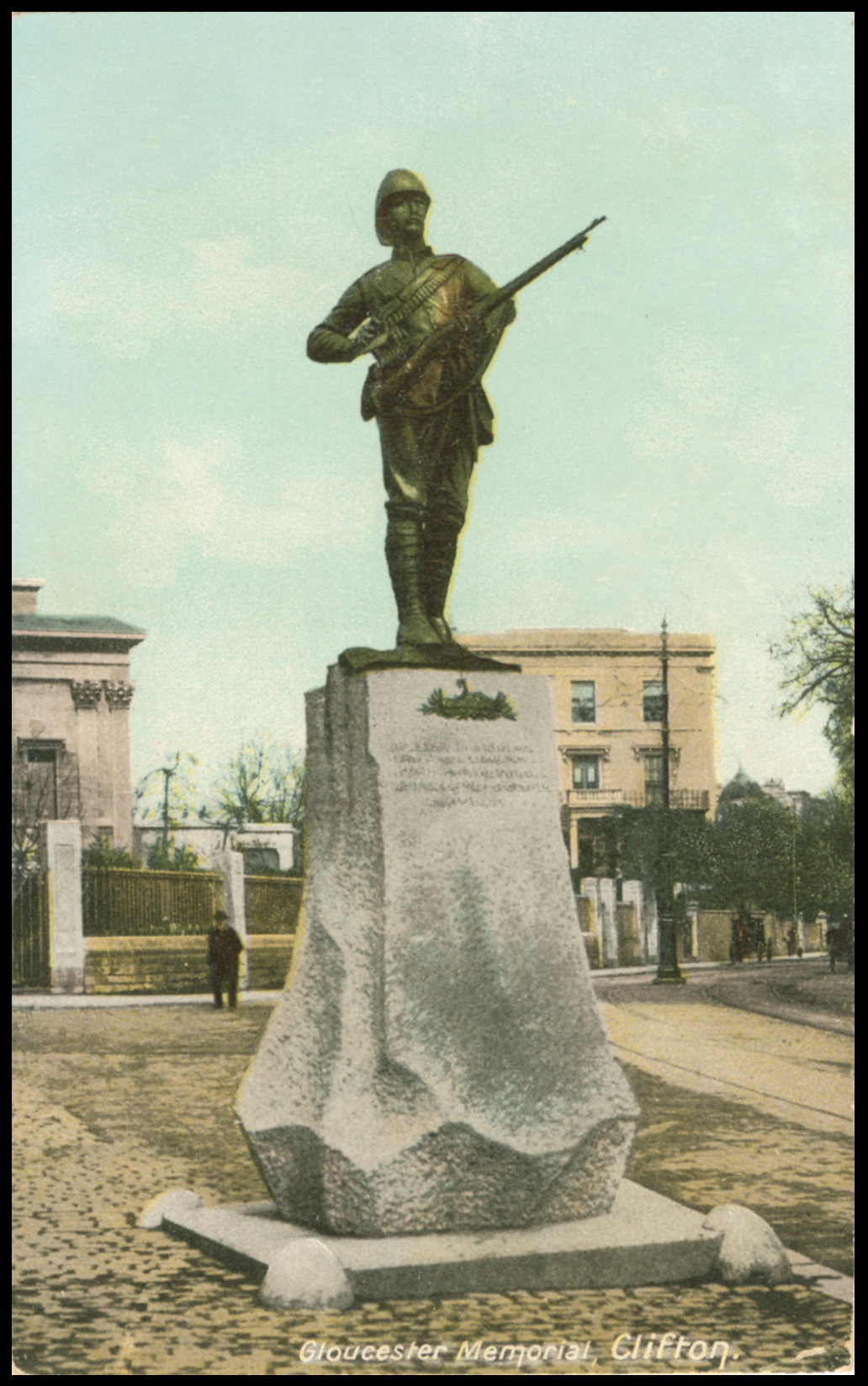
1913. Postcard. CYPHERGAT 'NO 16 13' to CYPHERGAT. (Gloucester Memorial, Clifton.)'.
Sadly, this high res image is not sharp enough to read the inscription on the memorial. However, the internet tells us exactly what it says. (I trust!). This is a curious memorial in terms of the names used to describe the war. Google begins by describing it as the "Boer War Memorial Gloucester Regiment", then calls it "Second Boer War (1899-1902)". It is located in Queens Road, Bristol.
Google says "This memorial commemorates the soldiers of the Gloucester Regiment who gave their lives in the Anglo-Boer War (1899-1902). Unveiled by Field Marshall Lord Roberts, V.C. K.G. on 4 March 1905. There are 251 names listed on the monument" which is inscribed "In memory of the Officers, Non-Commissioned Officers and Men of the Gloucestershire Regiment who gave their lives for their Sovereign and Country in the South African Campaign, 1888-1902. Erected by all ranks of the seven battalions of the regiment"
The 1st and 2nd battalions received battle honours for the Defence of Ladysmith, Relief of Kimberley, Paardeberg and South Africa 1899-1902 to add to its colours. The 3rd (Volunteer) and 4th (Militia) battalions were also awarded South Africa 1899-1902.
So in summary, Google calls the war both the Boer War and the Anglo-Boer but the memorial which was erected closest to the time of the conflict calls it "the South African Campaign". From this lack of clarity we can see the 'South African War' running alongside the 'South African Campaign' and the prejudiced 'Boer War' assuming its common and vulgar popularity. While the name 'Anglo-Boer War' did exist in a very minor way back then, its modern use was developed by historians with a political and racial axe to grind.

